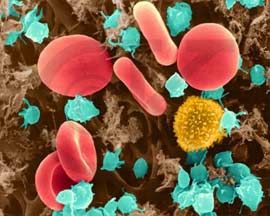A new cancer treatment using a triple antibody combination has demonstrated unprecedented success in mice. Not only does it eliminate tumors—even those that have metastasized—but it also prevents tumor regrowth. Furthermore, the treatment can be applied to various types of tumors.
 |
T lymphocyte (Photo: kolonpharm) |
The idea of utilizing the body’s immune system to kill cancer cells has long been recognized. Our immune system contains white blood cells called T lymphocytes, which seek out and destroy cancer cells. However, the body’s natural response to tumor cells is often not strong enough to eliminate the entire mass.
The new therapy developed by researchers from Australia and Japan, named TrimAb (combination of 3 monoclonal antibodies), aims to address this issue.
The team led by Mark Smyth from the Peter MacCallum Cancer Centre in Australia and Kazuyoshi Takeda from Juntendo University in Japan utilized a mixture of three different antibodies.
The first type directly attacks the tumor by activating receptors that trigger a death protein on cancer cells. Supporting it are two additional antibodies that activate T cells to target the tumor.
The TrimAb therapy completely eradicated large breast tumors in over 80% of the experimental mice. In contrast, when only a single antibody or a combination of two was administered, less than 30% of the mice had their tumors disappear. Moreover, this therapy was a radical cure for 60% of the mice whose breast tumors had spread to the lungs, liver, and brain.
Researcher Smyth explained that the TrimAb therapy causes T cells to produce a immune molecule called interferon gamma. “This molecule is the key to destroying the tumor.” In cases where only one or two types of antibodies were used, this immune molecule was not produced.
TrimAb is not limited to breast cancer. Smyth stated that it is also effective against kidney cancer and sarcomas.
This combination of three antibodies has never been used to treat cancer in patients, Smyth noted. Although this combination is not toxic to mice, trials need to be conducted on humans to confirm its safety.
T. An


















































